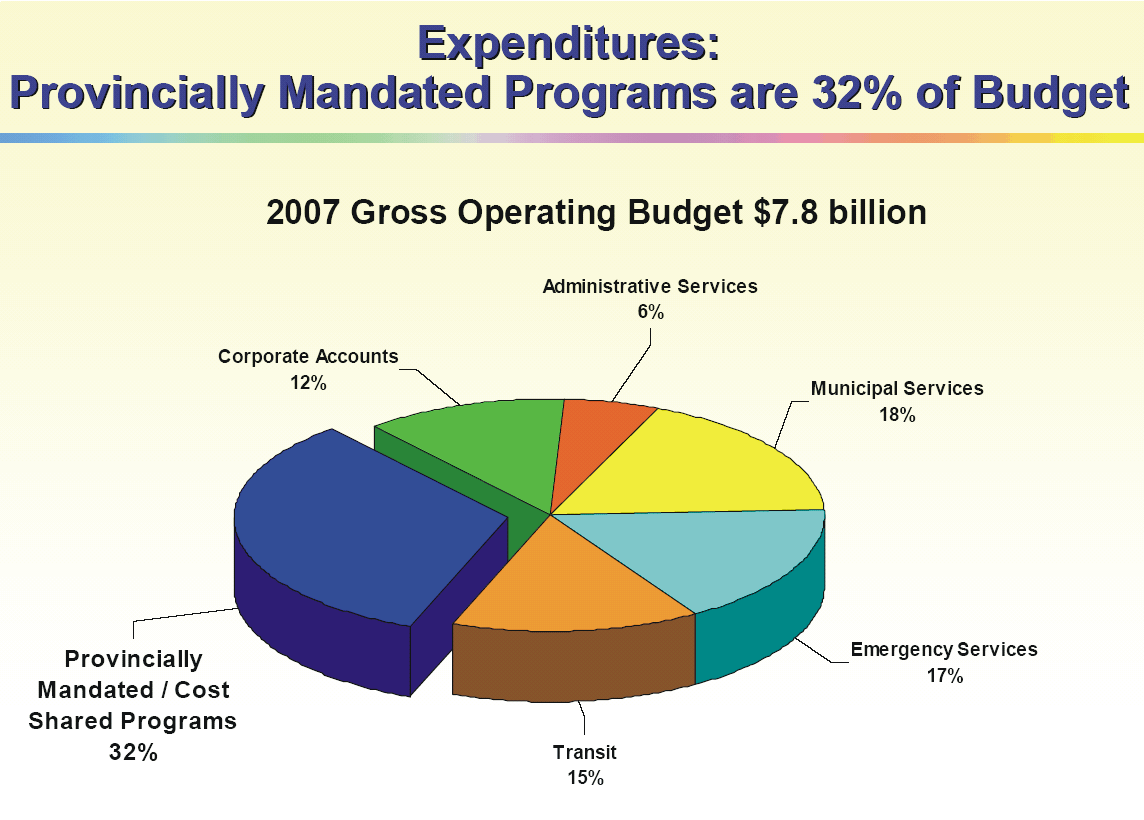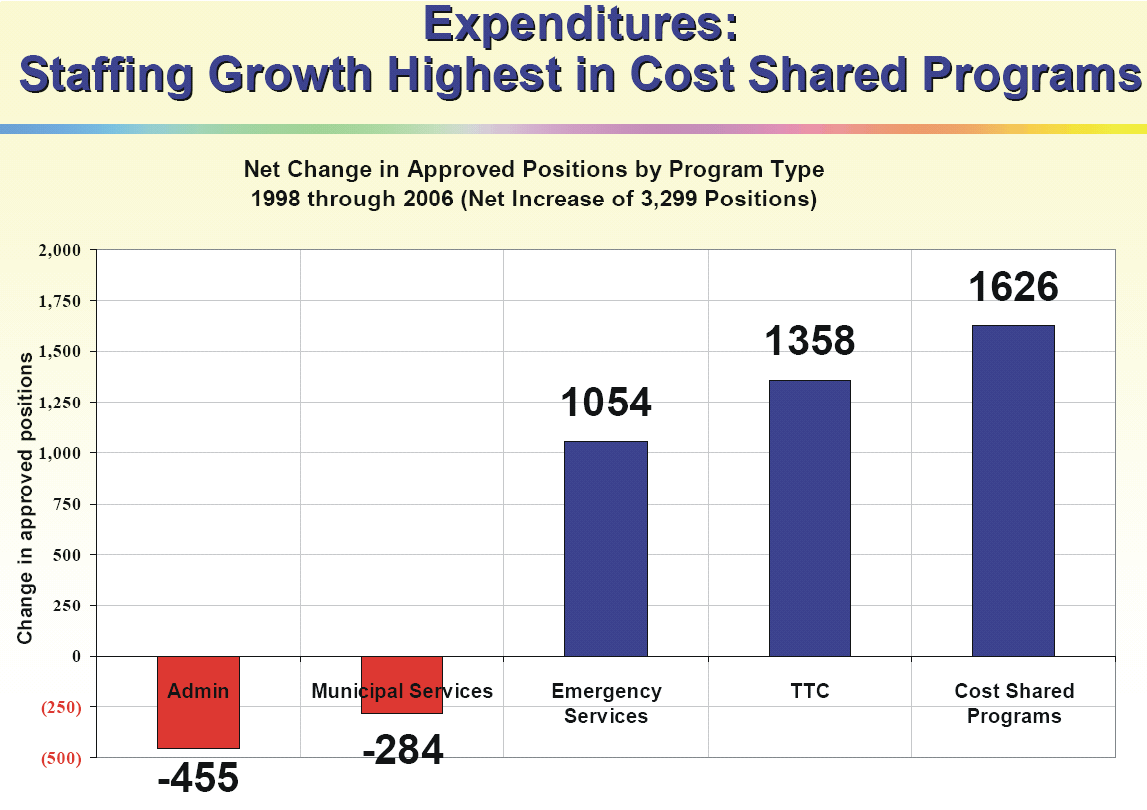The City's Deficit: Challenge and Response
The challenge facing the City is an immediate one: the City has a Revenue shortfall of nearly $600 million in the 2008 budget. (The Conference Board of Canada concluded that the City's "structural" deficit is closer to $1 billion a year.)
Question: Why has the tax issue suddenly surfaced? Did the City not see it coming?
Answer: I certainly did and that is why I began talking about tax reform a long time ago. But many Councillors preferred to "put it off" and, instead, recommend: selling city assets; accessing reserve bank funds; introducing user fees; raising property taxes (usually by 3%); and relying on the federal and provincial governments for bailouts.
In short, no one wanted to be the one "to bell the cat."
Today, we have few remaining assets, our reserve accounts have been drained, and the provincial and federal governments have told us to manage our own financial affairs.
Further, planners tell us that we have to be prepared for additional costs of serving an extra million people over the next 25 years!
Clearly, the problem has grown over the years and we cannot avoid facing it today.
 The SHORT Analysis The SHORT Analysis 
THERE ARE THREE POTENTIAL ACTIONS WHICH CAN BE TAKEN TO RESPOND TO THIS CRISIS:
1. Cut City Services
This is the most frequently recommended option. And it's been the City's first option as well. In 2007, the City saved $70 million. Since amalgamation, it has saved over $500 million in total.
2. Increase Property Taxes
This has been the traditional way of paying for most city services.
In 2002, New York City faced the challenge of a $6 billion dollar shortfall. Mayor Bloomberg responded with an 18½ % increase in residential and property taxes.
The size of the increase to cover Toronto’s financial shortfall would need to be 20% or more for an indefinite period. Unfortunately, this could impact the quality of life for many residents and pose an immediate financial hardship for low-income families and seniors on fixed pensions.
3. Develop NEW Revenue Streams
Most of the big cities of the world have long abandoned property taxes as their primary source of income, for the reasons outlined above, and have moved into user fees and alternate tax revenues in an effort to distribute the tax load more fairly.
My Position:
- Continue #1. I recently pointed to the Mayor a possible $50,000,000 annual savings in the city's running of the 160,000 units run by the Toronto Community Housing Corporation (TCHC).
- Seek a bit of relief in the minor area in #2.
- Make #3 as fair as possible.
 The LONG Analysis The LONG Analysis 
THERE ARE FOUR POTENTIAL OPTIONS WHICH CAN BE TAKEN TO RESPOND TO THIS CRISIS:
1. Cut City Services

Question:
Can revenue not be saved by reviewing and possibly eliminating low priority programs controlled by the city?
Answer:
Since amalgamation in 1997, utilizing over 80 “value for money” audits performed by the city’s auditor, we have saved $500 million in total.
The reality is that in this upcoming budget year the savings that Council could recommend without touching core services will probably be under a $100 million. That leaves a $500 million shortfall.
Please look at this chart. It shows where the city has cut costs and where costs have risen. Notice the essential services that would have to be cut in order to balance the budget.

My number one priority has always been to ensure that the communities are served efficiently and effectively.
I’m constantly hearing that we need better TTC service in Scarborough (subway or rapid transit line); more policing; more fire and ambulance; more community centres; more recreational programs; and more by-law enforcement.
These are all necessary programs but we need the revenue to fund them.
Question:
We constantly hear through the media about financial mismanagement at City Hall. Is there any truth to this?
Answer:
We all know that there are financial challenges which every government and business face. But I can assure you that it is overstated by the media.
The Province recently appointed an independent auditor to look at the City’s books and he concluded that Toronto was one of the best financially managed cities in Ontario in 47 out of 50 categories.
2. Increase Property Taxes
This has been the traditional way of paying for most city services.
In 2002, New York City faced the challenge of a $6 billion dollar shortfall. Mayor Bloomberg responded with an 18½ % increase in residential and property taxes.
The size of the increase to cover Toronto’s financial shortfall would need to be 20% or more for an indefinite period. Unfortunately, this could impact the quality of life for many residents and pose an immediate financial hardship for low-income families and seniors on fixed pensions.
3. Develop NEW Revenue Streams
This has been the traditional way of paying for most city services.
Unfortunately it's a flat tax that's blind to the property owners' economic situation and is particularly hard on seniors.
And the size of the hit that would be needed to cover a ½ a billion dollars would be 20% or more! And that increase would stay with the property forever.
4. Seek new revenue sources
Most of the big cities of the world have long abandoned property taxes as their primary source of income, for the reasons outlined above, and have moved into user fees and alternate tax revenues in an effort to distribute the tax load more fairly.
Recently, a resident telephoned and expressed how worried she was with the proposed land transfer tax. I asked her if she had plans to buy a home. She didn’t, so I then asked her if she was nervous about continuing to receive the City’s services and programs without having to pay extra for them. She wasn’t and therein lies the value of this option.
Question:
Some people are talking about moving to the 905 to escape these new taxes. Would that help them?
Answer:
I’m puzzled that people would talk about moving to an area where property taxes are higher than Toronto’s. Click here for more info.
| Region
|
Current Property Tax
|
Multiply by
|
New Property Tax
|
| York |
$ |
1.19653 |
$ |
| Peel |
$ |
1.175504 |
$ |
| Durham/Mississauga |
$ |
2.00416 |
$ |
And, imagine, you'd be paying those extra taxes for as long as you live there! And receiving fewer services in return.
Question: Are the new revenue streams the complete, final answer to the City's financial problems?
Answer: I see these sources as an interim response – a bridge to a more permanent, fairer system of taxation involving user fees, income tax, sales tax, and GST. With these in place, I believe that property taxes could be significantly lowered as 905ers, tourists, and non-property owners begin to pay their fair share based on ability to pay and use of service in Canada’s biggest, most complex City. (Chicago’s residential property tax is $712.00! Toronto’s is $2,300.00).
So there you have it.
I hope that I have clarified for you why I support investigating New Revenue Streams in a continued commitment to protecting our quality of life in our city.
Toronto is one of the world’s leading Cities. The competition to remain at this level is fierce and, if we cannot find the revenue resources to invest into our city, then the variety and richness of lifestyles for its residents will begin to constrict. What a legacy to leave future generations.
If you have any questions, comments or solutions that I’ve not considered, please give me a call. Sincerely, Norm Kelly

About Norm Kelly | Community Based Services | Norm in the Community | Latest News | Community Calendar
Riding Profile | Important Phone Numbers | Contact Information
Feedback | | Link to the City of Toronto | Home
|



